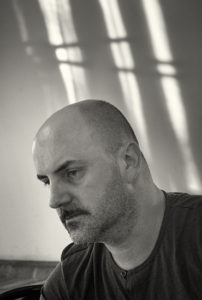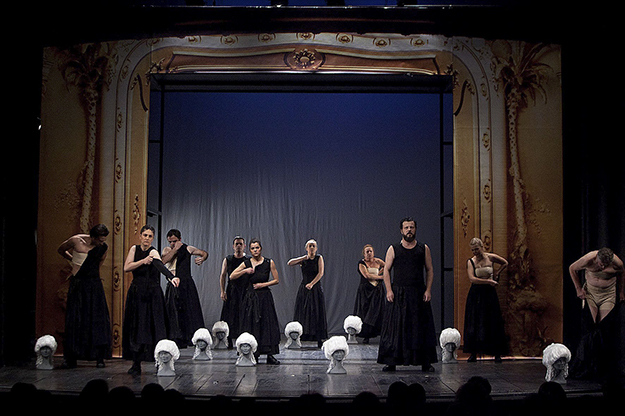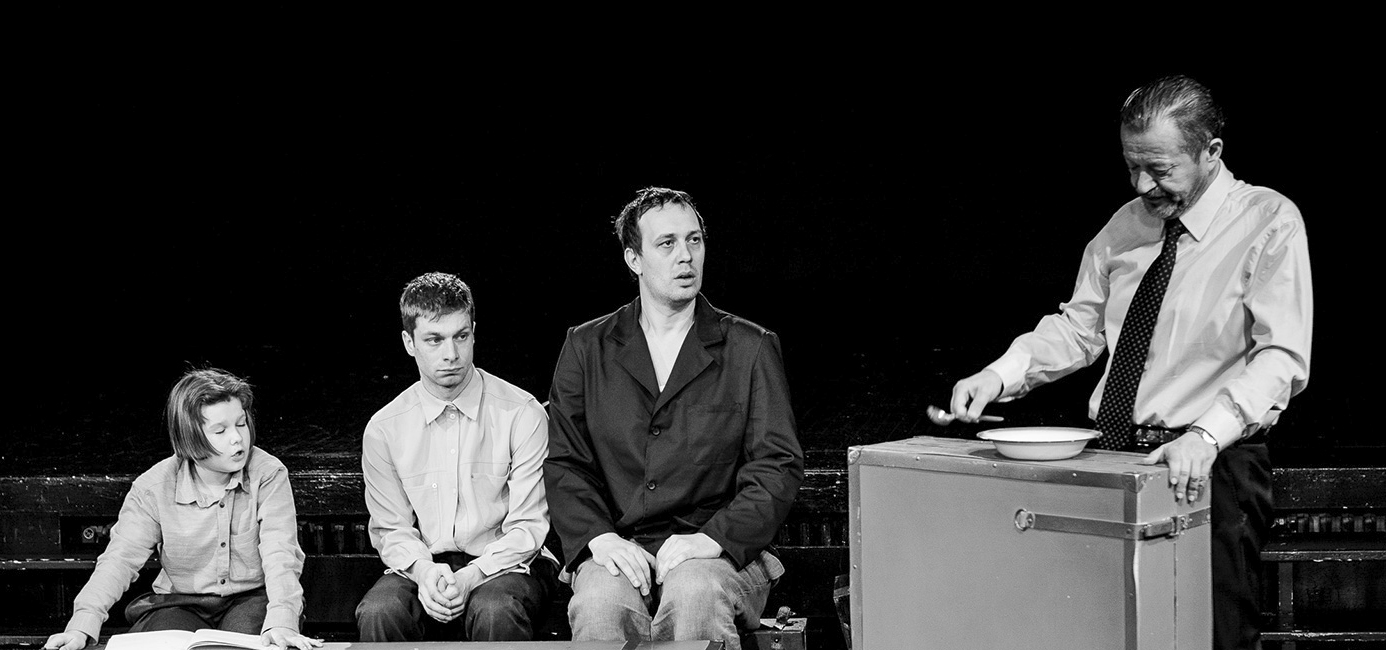What makes Kokan Mladenović popular in former Yugoslav states is his activist approach to theatrical production.
Born in Niš in 1970, the stage director touches upon the issues troubling the generations of people growing up in the ’70s. Having witnessed the breakup of one country and the creation of several others — and subsequently having lived through the war and the post-war period marked with corruption — many are slowly giving up hope for the future. His biography still lists him as living in Yugoslavia.
At the Festival of Bosnian-Herzegovinian Drama recently held in Zenica, he won an award for his play “Do You Remember Dolly Bell?” based on a novel by Bosnian-Herzegovinian author Abdulah Sidran. The novel served as a template for a cult film of the same name directed by Emir Kusturica, but Mladenović was the one who created its first stage adaptation.
In 2018, Mladenović received seven accolades for his play “Jami District” (“jami” being the imperative form of an archaic verb meaning “grab,” “loot” or “snatch” in Bosnian/Croatian/Serbian) at the Sterijino Pozorje Festival in Novi Sad. The work was described as “delving into the concepts of the nation and nation-state within the hi-tech context.”

Photo: Kokan Mladenović’s private archive.
Later that year, at the National Theater in Banja Luka, he put on the socially engaged play “Karoline Neuber,” written by the Serbian author Nebojša Romčević. It follows the story of the eponymous German actress who attempted to reform a local theater at the end of the 18th century, even though the public was much more keen on lighter entertainment. Through her perspective, Mladenović points out that theater needs to be a serious art form rather than a funfair.
“Of course, she was beaten by contemporary showbusiness, just like we suffer defeats at the hands of the modern entertainment industry,” he says. “Nevertheless, we felt responsible to speak up as individuals who take our work in theater very seriously.”
K2.0 met with Kokan Mladenović twice — the first time shortly after the play was staged, and again in April 2019.
Speaking about theater in the region, politicians, as well as the theater audience, Mladenović reveals that he “would like culture professionals to use their primary fields of interests in order to engage in a more fruitful dialogue with the times they live in.”
K2.0: It has been almost a year since the premiere of the play “Karoline Neuber.” Simultaneously, culture budgets in Bosnia and Herzegovina have remained at the bare minimum. Should this set off a stronger reaction amongst Bosnian-Herzegovinian culture professionals? Is there also a cause for concern that culture may no longer be publicly funded?
Kokan Mladenović: The treatment of culture in our countries is outrageous to such an extent that there is no reason for us to put up with our authorities, who go out of their way to minimize the role of the arts and of education in our society. Their goal is to establish empires where they will be able to revel in their primitivism and hauteur.
It is precisely this political practice that gives rise to generations of people who barely have any need for culture. At some point, all of us art professionals are going to become downright redundant because, simply put, there will be no audience left.
Cultural needs ought to be taken care of systematically, starting from the day a child enters kindergarten, and then at the higher levels of education. In addition, culture should be given wider exposure in the public sphere.
When this carefully constructed policy on culture is dispensed with, however, the consequences are dire. We have already begun paying the toll for the systematic neglect of culture.
If a country’s culture exclusively entails carnivals, bullfighting and similar events, then that country is faced with a serious problem.
What proves to be worse for theater itself: money and power, or the lack thereof?
All of us are accustomed to living and working in poverty, so theater workers being penniless is nothing out of the ordinary. In any case, cultural spending should never be close to zero. These numbers show how impervious the ruling elites are to the importance of the arts and education for the future of a country and its people.
We have tried to raise our voice against this policy. When you set aside a trivial amount of money for culture, all the while generously funding the “showbusinessization” of society, you defend primitivism in any shape or form — or, at the very least, you do not contribute to the fight against the reality show world we are all part of. If a country’s culture exclusively entails carnivals, bullfighting and similar events, then that country is faced with a serious problem.
Previously, the “National Theater” of Republika Srpska — where you staged the play — was used by the “National Theater” of Bosanska Krajina. Before that, the premises belonged to the “National Theater” of Vrbas Banovina. The building seems to have been seized by every single administration to date…
It’s not any different in Serbia, North Macedonia, Croatia or the rest of Bosnia and Herzegovina. These are the kinds of constructs we live in. As Ilarion Ruvarac [a Serbian historian and clergyman] used to say: “You keep these people at the level of a herd on purpose, since a smarter populace would call for a smarter ruler.”
Some facts are much more absurd than the one you have mentioned. For example, it’s preposterous that there is an academy in Banja Luka producing generations of actors and actresses, and that there are similar academies in Bijeljina and elsewhere, while there are only two and a half or three theaters in the entire Republika Srpska. Why do you educate new actors and actresses when you don’t open new theaters?
In Belgrade alone, more than a hundred young actors and actresses per year finish their studies, but new theaters are nowhere to be found. Moreover, these young men and women are denied employment by the existing theaters. There is no alternative scene either, and when it comes to vacancy applications and other proposals, political compatibility is always given priority over artistic relevance.

The play “Karoline Neuber.” Photo: The National Theater of Republika Srpska.
Your actors often use the stage to send a message to the government. Do they thereby express disobedience?
I think we all lack civil courage, regardless of whether you are a culture or theater professional, or something else.
In some better-off countries, citizens protest against whatever tramples upon their civic freedoms and civil rights. Here, it all revolves around party affiliations. It doesn’t matter if you are deeply hurt as a citizen of a certain country — you will not take to the streets. This misuse of democracy is not specific to the people living in this region, but it is a grave misuse nonetheless.
We never seem to get through our heads that the government we have elected is indeed a group of people who live off the taxes and contributions paid by us. We are the ones who enable them to earn their pay, since they produce nothing at all. We deal with production work and pay our duties so that they can exercise executive powers.
On the other hand, the people in power ought to serve the majority of the population and society as a whole — they should contribute to the state in the way we have opted for, not merely govern a given people or society. By what right do you rule over me in a democracy where you and me, as well as the president, are equal before the law?
The money they so generously give us is ours, not theirs. We have raised it in order for the state to function properly.
Is it then the people, the system or the state itself that needs to be changed?
First and foremost, it is civic awareness that needs to undergo a change. Spending a negligible amount of budget on culture is like giving alms out of your own pocket while treating yourself with cars, helicopters and vulgar singers at the same time. The money they so generously give us is ours, not theirs. We have raised it in order for the state to function properly.
One should change the powers that be just like one changes a dentist or a fridge repair person when their performance does not meet one’s standards. I pay for their services, so, having the right to say that I want someone else, I choose the people in charge by the same token. Yet, we consent to our humiliation. We have agreed to give them unchecked power.
You have these particular elites who do not care about party membership within their ranks since they enjoy various benefits. At the same time, we keep our mouths shut because we are nothing but cowards. As time goes by, the more I am convinced the root of the problem lies in ourselves.
The fact that two-thirds of Serbian citizens ecstatically elect Aleksandar Vučić as their president speaks more about the former than the latter. If this is a manifestation of your political intelligence and taste — which goes hand in hand with this historical amnesia with regard to who this person was and what he did in the past — then you probably do deserve a leader like Aleksandar Vučić.
Unfortunately, the establishment we have is not an establishment that has risen to power by force, through a coup or some other sort of upheaval. These people have been elected democratically. They are the measure of our political consciousness, or rather of our political unconsciousness.
Is theater, in a sense, a victim of political processes?
Whatever it sets about to do, theater is politics to some extent. It is a public institution based on public expression taking place on stage — therefore, it is capable of changing the world. Until Gutenberg invented the [printing] press, it had been the only mass medium. Whoever wanted to reveal something important or comparatively valid to the public, they did so exclusively while treading the boards.
It is their duty to speak up, as well as to make the world a better place, and they are to do so through artistic means.
The power of theater is enormous. When you have something to say to a group of three or four hundred people, you are not only in a position to alter the public perception of a specific issue, but also to bring about other changes. Having given up this power of public expression, we have chosen to work out compromises, mince words and come up with meta-metaphors so we are able to remain the artists who never utter anything — God forbid — radical about our distorted reality.
However, this division between artists and citizens is atrocious. Artists are citizens who are acutely aware of the problems of their time. It is their duty to speak up, as well as to make the world a better place, and they are to do so through artistic means.

The play “Do You Remember Dolly Bell?” Photo courtesy of the 18th Festival of Bosnian-Herzegovinian Drama and Playwrights’ Theater, Zenica.
Do you believe that culture professionals based in former Yugoslav states could achieve more if they joined forces rather than through sporadic protests?
Personally, I would like culture professionals to use their primary fields of interest in order to engage in a more fruitful dialogue with the times they live in. Theater itself has this privilege of being a public gathering place. In turn, this privilege should be taken advantage of in a struggle against everything that puts down both artists and citizens in the audience alike.
Of course, all of us could do with more civic courage and activism in general since the world is on the brink of collapse, while we expect someone else to fix it for us.
Given the following options, how would you describe the activist approach to theatrical production — as an authentic manifestation of the present or as a language serving as a means for creating content?
You cannot separate form from the essence. It is just a matter of coming up with an adequate aesthetic framework that is to act as the artistic aspect of a certain content. The core of this framework should always remain active, so that it connects us with our Zeitgeist and with all its deviations.
If we add a political touch to a theater play, do we thereby create a wall of dialectics or a demarcation line between the like- and different-minded individuals?
The most successful plays brought forth by socially engaged theater are deeply political indeed, but these plays do not deal with politicking at all.
As is the case with any other art, theater advocates the establishment and preservation of the highest values, such as morality, justice, honor and other concepts that make us human. Therefore, it represents a natural antithesis to authorities who are, by default, inclined toward a set of values enforced by a manipulative system of their making — a system in which a handful of stakeholders bask in their own privileges at the expense of everyone else.
In this neoliberal dog-eat-dog business, civic values and democracy at large are the first to collapse.
It is imperative for us to expose their misdeeds and thus defend the arts, as well as its core values. Only poor quality theater tries to outdo government officials in a play of wits. In fact, we side with the arts and the truth only, not with this or that political party.
You recently travelled to Budapest, where you staged the play “The Tragedy of Man” nine years ago. Simultaneously, the repressive nature of the regime in Hungary is widely reported in the media. What is your take on the situation over there?
The European Union no longer stands for a community built upon the ideas of equality and humanism. Instead, it has become a vicious market, the goal of which is to accumulate already existing capital. In this neoliberal dog-eat-dog business, civic values and democracy at large are the first to collapse.
Taking into account the situation in Croatia, Poland or Hungary, it is obvious that it is the EU itself that either tacitly or openly supports political persecution, censorship and the totalitarian abolishment of democratic institutions, chiefly for the sake of its own economic and political interests. Likewise, the EU stands behind the Serbian government — as anti-democratic and anti-European as it is.
You are working on your new project in Romania. What issue does it bring into focus?
I am preparing the play “Swan Lake” with the help of the Csiky Gergely Theater ensemble from Timișoara — the ensemble that helped me with “Shakespeare’s Sonnet 66” two seasons ago. Though based on Tchaikovsky’s ballet, our rendition aims to highlight how adversely humankind affects its environment as vermin, thereby bringing about a practically unavoidable cataclysm.K
Feature image: Kokan Mladenović’s private archive.
This conversation has been edited for length and clarity. The interview was conducted in Serbian/Croatian/Bosnian.




